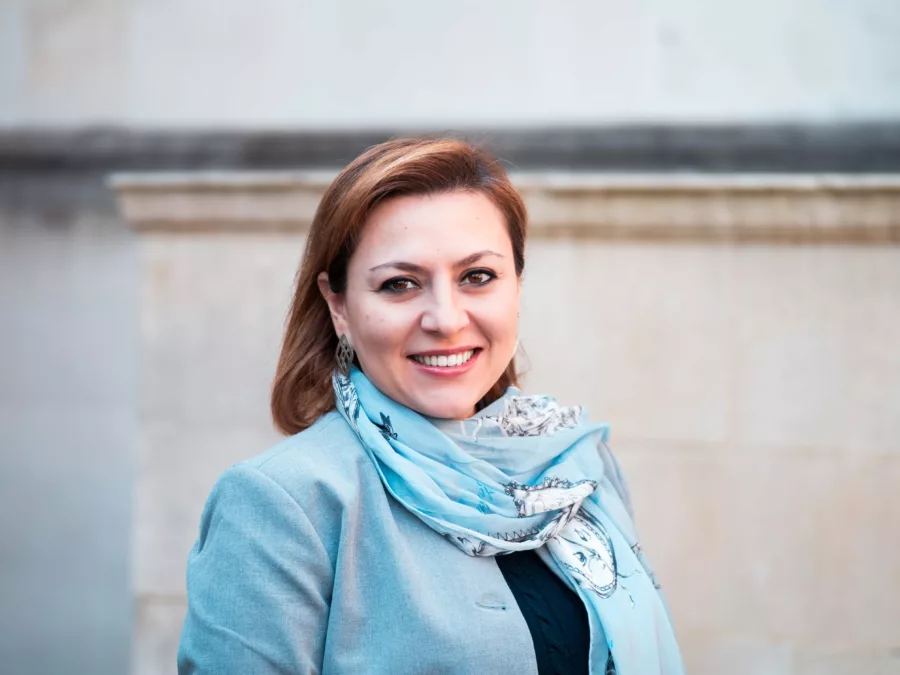Azerbaijan: positive role models for women in finance

Gular Pashayeva is the first woman board member at the Central Bank of Azerbaijan. She is on a mission to improve corporate governance and women’s representation in the financial sector in her country.
“I always wanted to be at the table,” says Gular, a deputy governor at the Central Bank of the Republic of Azerbaijan and chair of the Board of Trustees of Azerbaijan’s Deposit Insurance Fund. “I wanted my voice to be heard.”
Gular, who is currently taking part in our 2024/25 Wider Europe and Central Asia Fellowship programme, is passionate about improving corporate governance across the financial sector and increasing women’s representation at the highest level.
“I started to think about gender representation because I was often the only woman present in boardrooms and committees,” she says.
Inspiring women
According to the Central Bank by the end of 2024, 79% of employees in leadership positions in Azerbaijan’s banking sector were men, while 21% were women. Overall, 61.5% of employees in the banking sector were men and 38.5% were women.
Gular says: “We have a special panel that interviews all the top managers who apply to all the banks, insurance companies, and capital markets companies.
“I am a deputy chair. The majority of candidates are men; women make up 10 to 15%. But I believe that if there are women on the board, it will inspire more and more women at junior levels to want to achieve this as well.”
From law to governance
After studying law, Gular began her career as a cashier at PASHA Bank. She then moved to the legal department where she began researching corporate governance.
“This was in the early 2010s when not many people in Azerbaijan knew what corporate governance meant,” she says. “I saw an opportunity, so I spoke to the CEO. The bank supported me in getting a qualification at the Chartered Governance Institute of UK and Ireland. Then I helped them build up this function. It was my passion because it was totally new for us.”
Gular moved to the Central Bank in 2022 as an executive director. Describing the bank as a “mega-regulator”, she saw its huge potential to influence policymaking and drive change throughout the financial sector. My priority was to renew corporate governance standards,” she says. “We’ve made big progress, but gender diversity has not been addressed yet. My action plan for my John Smith fellowship is to come up with solutions.”
Gender diversity targets
Gular plans to develop a gender diversity agenda and targets within corporate governance standards, advocate for policy reforms and promote a culture of inclusion.
“We have already passed a recommendation paper saying that at least one woman should be present on the boards of top banks and other institutions,” she says. “But I want to see a change in the policy itself. I will have to convince our board to make this mandatory.
“I know the UK has set targets for women’s board representation by 2030. I would like to set such a goal. The ideal outcome is at least one woman represented in all institutions at the board level.”
Fellowship programme
During the residential part of her John Smith Trust fellowship, Gular will visit organisations including the Scottish National Investment Bank and the European Bank for Reconstruction and Development (EBRD). She wants to understand how these institutions have approached gender diversity targets and gain an evidence base to support her case.
“It will be very challenging to convince my board, which comprises five men and me, so I want to have strong grounds,” she says. “I want to know what paths UK policymakers took when they brought up this agenda so I can translate this to our realities.
“Before, I would say: ‘Let’s do this. It will be good. It’s a world agenda.’ But now I will have historical data from the UK, which I think is the best-in-class corporate governance country. Maybe someone can also share some tactics for convincing the board.”
Championing women
Gular’s action plan is not just about changing corporate governance principles to set a minimum level of representation. She will also provide training and mentorship to support women in finance.
“At the Central Bank we have the mandate of training the financial sector,” she explains. “We have already planned some leadership training for women this year.”
Gular has also made a point of promoting other women within the bank. She says: “Since I became an executive director at Central Bank, as a person in charge of HR as well, I promoted and supported the appointment of more women to more senior levels than ever in the history of Central Bank.”
Changing attitudes
So what are the social and cultural factors that are holding women back? Gular says: “What I see in our society is when women are given the opportunity, they can do it. Literacy is very important in Azerbaijan. Girls go to school, and they don’t lag behind. More women are applying to universities and getting accepted.
“But things change when women start a family because taking care of children is mostly up to them. Something has to change in families and society so women can keep working and advance.
“I’m not in a position to change attitudes within families. But I can help create positive role models for women that help change their attitudes towards work. When I became a board member here, more and more young women said to me: ‘We started believing that it is possible.’”
Find out more about our fellowship programmes
